| Reviews & Columns |
|
Reviews DVD TV on DVD Blu-ray 4K UHD International DVDs In Theaters Reviews by Studio Video Games Features Collector Series DVDs Easter Egg Database Interviews DVD Talk Radio Feature Articles Columns Anime Talk DVD Savant Horror DVDs The M.O.D. Squad Art House HD Talk Silent DVD
|
DVD Talk Forum |
|
|
| Resources |
|
DVD Price Search Customer Service #'s RCE Info Links |
|
Columns
|
|
|
Arbor, The
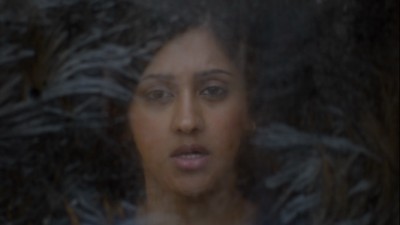
An astounding, outstanding amalgam of documentary, reenactment, literary biography, and politically committed cultural anthropology, Clio Barnard's The Arbor is a confident, calmly revolutionary act of cinema. Its intelligence, accomplished sophistication, and well-channeled depths of feeling are never showy or desperate to impress, but this frankly experimental film is on the whole so successful, it marks Barnard (rivaled perhaps only by Hunger auteur Steve McQueen) as the most exciting filmmaker to come out of the U.K. since Lynne Ramsay (Ratcatcher).
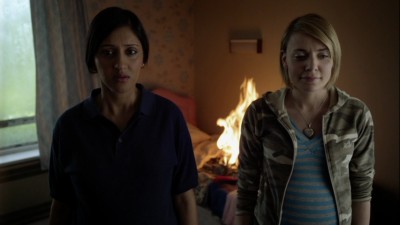 ">
">A central figure in The Arbor is the late, unlikely British playwright Andrea Dunbar (who also adapted one of her stage works, Rita, Sue and Bob Too! as a screenplay for director Alan Clarke's film version), a hardscrabble, tough-cookie single mother from the bleak public-housing council estates of Yorkshire, England. Barnard gives us a feel for who Dunbar was with footage from a 1989 TV documentary on her and her surprising achievements in a field (the theatre) generally reserved for the better-off and better-educated. Dunbar's first play, The Arbor--a seriocomic, autobiographical piece--caused much buzz and received widespread acclaim when it was produced in the late '70s. Its title (and, by extension, that of the film) comes from the nickname for the particularly notorious estate where Dunbar grew up (and remained even after her success would have allowed her to become socially mobile), and Barnard interweaves selected scenes from the play--depicting the harsh, rough-and-tumble, by turns violent and sardonically dealt-with lives of the British poor that are the provenance of the long-standing English kitchen-sink tradition--which are acted out and filmed in the present day in exteriors on authentic location, the same council estate where Dunbar lived the experiences she then dramatized and transfigured into art.
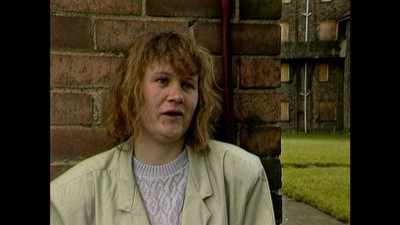
Barnard alternates her archival and quasi-theatrical footage with gorgeously shot sequences wherein actors portray Dunbar's surviving family and colleagues, focusing especially on her now-grown daughters, Lorraine (Manjinder Virk) and Lisa (Christine Bottomley). These scenes are based on interviews conducted with the actual people, with the actors lip-synching to their recorded voices--a fact we are made aware of by a title card in the opening credits. If this sounds like a gimmick, it plays as anything but; the actors are technically so good, we might not even realize that it is not their own voices we're hearing were it not for the information having been explicitly volunteered to us by the filmmaker. It is important for us to know, however, because it is instrumental in accomplishing one of the film's primary aims: to heighten our awareness of how slippery and unstable are our concepts of documentary, filmed representations of "reality," and Truth, whether cinematic or personal.
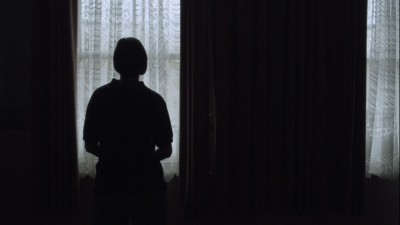
That is not to say that Barnard's work here is only interesting at the level of its aesthetic-philosophical experimentation and exploration, though it certainly is that. The stories that Lisa and, especially, the mixed-race Lorraine (her father was a Pakistani immigrant) have to tell are well-articulated, sad, and extremely troubling, revelatory both of Dunbar's lack of material and spiritual resources as a mother and of her classism-induced mindset of "once poor, always poor," which kept her trapped in a cycle that not even success and (some) money could break. During her girls' childhoods, Dunbar gradually descended into alcoholism (dying of uncertain causes, possibly related to her addiction, in 1990), and the chaotic shuffling between biological and foster family, as well as the neglect and outright abuse, recounted with different emphases and some contradictions by Lisa and Lorraine is appalling. Especially damaging for Lorraine was the rampant racism on the mostly-white council estates and schools, and the more latent but still obvious sort inflicted by her family, including her mother, all of which worked to render her highly susceptible to her own cycle of addiction and personal tragedy, the details of which are almost as tough for us to hear as they obviously were for her to remember and verbalize, and for Virk to enact with the proper respect and emotional nuance. The entire cast, most notably Virk as Lorraine, is superb. It is not just the skill with which the actors are able to mouth the lines spoken by the real people they're embodying; the emotional intuitiveness they bring to their roles, evident in their facial expressions and body language, make their "characters" very real and very moving, capable of evoking feelings in us that are as strong, if not more so, than any those that could be elicited by any more conventionally scripted and acted character.
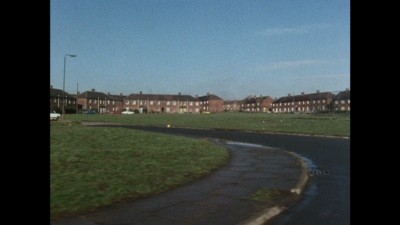
THE DVD:
The anamorphic, 1.78:1 aspect-ratio widescreen transfer of The Arbor is excellent. The film was shot brilliantly by cinematographer Ole Bratt Birkeland on the increasingly popular ultra-high-quality RED digital video camera (which has been used by Steven Soderbergh for Che and Todd Solondz on Life During Wartime), and the suitability of that digital shooting process for perfectly retaining all visual properties when transferred onto home media like DVD is reinforced once more by the rich color, light, and shadow so clearly discernible here.
Sound:Though hardly stadium-multiplex immersive, the film's sound is an unusually important element of The Arbor, and the disc's Dolby Digital 2.0 soundtrack (with non-optional English subtitles meant, like those added onto the North American release of Lynne Ramsay's Ratcatcher, to render the film's distinctive, very heavy British Isle speech patterns comprehensible to us Yanks) conveys every nuance of dialogue and music with indefatigable clarity.
Extras:The only extra included here is The Arbor's theatrical trailer, along with several other previews for Strand Releasing titles.
FINAL THOUGHTS:The Arbor is a work impressively executed on every level of form and content. Its conceit of having actors lip-synch to audio from interviews with the real people they're portraying works miraculously well, retaining all the realist and emotive properties of the interviews while adding a bracing intellectual and aesthetic element that exponentially expands the film's power to enthrall, edify, and move. Barnard is a filmmaker to keep our eye on; with her impassioned artistry and the beginnings of a distinctive personal style, she may one day soon take a place alongside Mike Leigh and Terence Davies as a unique, visionary standard-bearer of British cinema. Highly Recommended.
|
| Popular Reviews |
| Sponsored Links |
|
|
| Sponsored Links |
|
|
| Release List | Reviews | Shop | Newsletter | Forum | DVD Giveaways | Blu-Ray | Advertise |
|
Copyright 2024 DVDTalk.com All Rights Reserved. Legal Info, Privacy Policy, Terms of Use,
Manage Preferences,
Your Privacy Choices | |||||||












